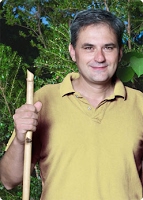
An earth science journal has asked an editor to resign after it was revealed he had been manipulating citations at multiple journals.
Artemi Cerdà had already agreed to step down temporarily from Land Degradation & Development after the publisher, Wiley, was alerted that Cerdà had resigned from other journals for citation manipulation. In a new statement, the journal announces that Cerdà’s resignation has become permanent.
Here’s the entire statement:
Wiley first became aware of the allegations of citation irregularity in LDD when a member of the community raised some concerns at the end of 2016. In this case, the allegation was that authors were being asked by Prof Cerdà to add citations to their papers.
We were then contacted by Copernicus in February who had completed their own investigation into citation irregularities between their titles and LDD. Prof Cerdà was Editor of Soil, Solid Earth and Earth Surface Dynamics at Copernicus. The conclusion of the Copernicus report was that Prof Cerdà was manipulating citations; he consequently stepped down from all three titles.
Prof Cerdà agreed to step down from LDD temporarily. We undertook a thorough investigation in line with the principles of COPE and found evidence of citation irregularities in LDD. We have therefore requested Prof Cerdà step down permanently.
Last month, we reported that an unnamed editor had resigned from two journals published by Copernicus and the European Geosciences Union. Eventually, the EGU reversed course and named the editor as Cerdà. According to the release from Wiley, a third Copernicus/EGU journal — Earth Surface Dynamics — was also involved.
Hubert Savenje, EGU publication committee chair, told us he believed Wiley was mistaken, but would investigate further. Savenje confirmed Cerdà is not currently an editor of Earth Surface Dynamics. (Note: See update, below.)
Eric Brevik, the executive editor of Soil, also resigned from that journal, saying the “distraction…is not in the best interests of the journal.” According to the LDD statement, Brevik resigned from LDD in February, as well.
LDD’s Impact Factor has risen dramatically, from 3.089 in 2014 to 8.145 in 2015.
Cerdà has also resigned from the editorial board of Geoderma, published by Elsevier.
In its statement, LDD mentions an anonymous report that’s been circulating about this episode:
We are also aware of the report circulated by ‘Akhenaten McDonald’ alleging that a number of researchers and journals were involved in a citation cartel. We are continuing to investigate these allegations in regards to LDD.
The EGU issued a response to that report last month.
Update, 5:30 p.m. Eastern, 3/21/17: As a commenter points out, Cerdà has also stepped down from the editorial board of Catena, an Elsevier journal.
Update, 8:18 a.m. Eastern, 3/23/17: A spokesperson for the EGU/Copernicus journals confirmed that Cerda had resigned from Earth Surface Dynamics (ESurf) when he stepped down from SOIL and Solid Earth. All three resignations took place when he was first confronted with the results of the analysis and he therefore pre-empted EGU to dismiss him from the three editorial boards. In the analysis, the publisher has not found any evidence that Cerda had manipulated citations at ESurf, nor did Cerda appear to overly encourage citations to ESurf at the other journals where he held editorial positions.
Like Retraction Watch? Consider making a tax-deductible contribution to support our growth. You can also follow us on Twitter, like us on Facebook, add us to your RSS reader, sign up on our homepage for an email every time there’s a new post, or subscribe to our daily digest. Click here to review our Comments Policy. For a sneak peek at what we’re working on, click here.
Prof Cerdà has co-authored at least four papers in the journals Soil, Catena, Soil Research, and Land Degradation & Development in the last two years with more than 50 citations (according to Google Scholar):
– Keesstra et al. The significance of soils and soil science towards realization of the United Nations Sustainable Development Goals, SOIL 2:111-128, 2016 (90 citations)
– Proscodicimi et al. Soil water erosion on Mediterranean vineyards: A review, Catena 141:1-21, 2016 (66 citations)
– Cerdà et al. Use of barley straw residues to avoid high erosion and runoff rates on persimmon plantations in Eastern Spain under low frequency–high magnitude simulated rainfall events. Soil Research 54 (2):154-165, 2016 (66 citations)
– Pereira et al. Modelling the impacts of wildfire on ash thickness in a short-term period. Land Degradation & Development 26(2):180-192, 2015 (59 citations)
If these citation counts are inflated due to inappropriate editorial pressure, how can the journals remedy the situation?